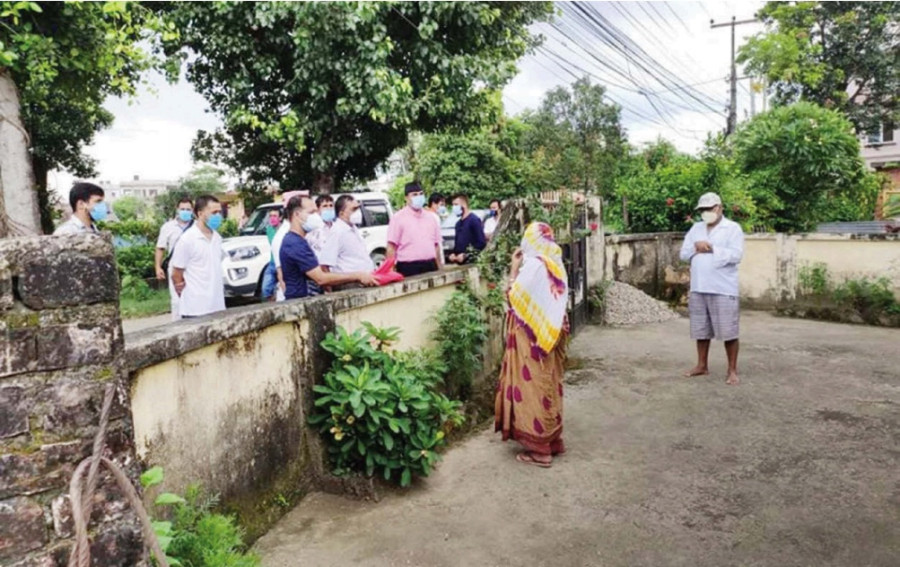Health
Half of Covid-infected people not maintaining social distancing at home, study finds
Public health experts say the findings are alarming as the second wave of infections may start soon in the country.
Arjun Poudel
Nearly half of the people infected with Covid-19 placed in home isolation have not been following social distancing norms, a study carried out by the Nepal Health Research Council has found.
Public health experts say that the findings are alarming and suggested that the authorities concerned start preparations for the second wave of infections, which they say might start very soon.
The study was carried out in 536 people placed in home isolation. Their details were provided to the council by the Epidemiology and Disease Control Division. “Among the people surveyed 35 percent were found to have been following social distancing norms sometimes and 12.5 percent did not ever practice social distancing,” said the report, presented to the Ministry of Health and Population recently.
With the number of new cases starting to spike and beds in hospitals falling inadequate, authorities concerned allowed infected people to isolate themselves at home. However, there was no mechanism to monitor the infected people and check if they have been following protocols or not.
“Only 52.5 percent of participants who were placed in home isolation were found to have been following social distancing norms with their family members,” the report said.
The authors of the report said that around 12.5 percent of people who participated in the study did not even observe basic safety protocols at home after testing positive for coronavirus. “Around 12.5 percent of the participants were doing their regular work and coming out of their homes even after knowing they were infected,” said Dr Megnath Dhimal, chief researcher at the Council.
The study found that 59.3 percent of infected people placed in home isolation took gurjo (Tinospora cordifolia) and turmeric solution as a treatment for the infection. Over 58 percent of the infected people were found to have gone through mental disturbances while isolating themselves at home, and 10 percent did not accept that they had been infected.
Due to the lack of separate rooms and separate toilets, many infected people had been compelled to conceal their infection status, shared rooms and toilets with other family members and friends.
The study also shows that around 43 percent of participants had problems managing separate rooms for isolation, 26 percent had problems managing separate toilets, and 20.7 percent had problems related to the supply of daily essentials. Around 10 percent could not buy medicines when needed. Over 21 percent of participants had pre-existing conditions such as diabetes, tuberculosis, and HIV.
Likewise, over 22 percent of participants complained that they had problems availing transport services to visit hospitals during emergencies. Around 66 percent of the participants were asymptomatic.
“A lot of well-developed countries that had successfully contained the spread are now facing worse conditions and have imposed restrictions due to a surge in new cases,” Binjwala Shrestha, assistant professor at the Institute of Medicine, told the Post.
“Authorities concerned should start preparing for the second wave of infection in our country.”
Instead of rectifying past mistakes, authorities concerned have given up on interventions such as free testing contact tracing. This, according to experts, significantly brought down the number of reported cases.
“Proper isolation of the infected people and maintenance is social distancing is the way to contain the spread of a highly contagious virus like the SARS-CoV-2,” Shrestha, who is also a public health expert, added.
The Health Ministry had decided to form community level Covid-19 monitoring groups comprising local health workers, female community health volunteers, youths, and representatives of civil society to monitor the infected people. However, due to a lack of knowledge about infected people, such groups could not work effectively.
Local governments, which are responsible for contact tracing, have stopped collecting swab samples for polymerase chain reaction tests after the government stopped free testing of the asymptomatic people.
After the government removed all restrictions imposed to contain the spread of coronavirus infection, everything has returned to the pre-pandemic period.
“People have stopped fearing the infection and have stopped wearing face masks and maintaining social distancing,” Dr Sher Bahadur Pun, chief of the Clinical Research Unit at the Sukraraj Tropical and Infectious Disease Hospital, told the Post. “Neither the general people nor authorities concerned are taking the risks seriously. This is not a good sign.”




 27.41°C Kathmandu
27.41°C Kathmandu















